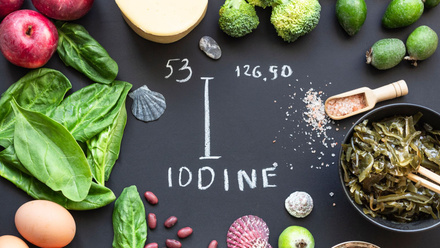Written by Chair of the British Dietetic Association (BDA) England Board Dr Julie Abayomi and co-authored by James Sandy.
For myself, and many colleagues, lockdown coffee breaks have become opportunities to ponder our lifestyles and working patterns, what we are eating, where it comes from and what we really know about our daily diets.
‘Veganuary’ (which we are nearing the end of) is a case in point. Veganism in the UK has seen a considerable increase in the past decade [i] and products made from ‘plant-based alternatives to milk’ are becoming increasingly popular, especially with young women (16-24 year olds).
Many people in the UK embark on a vegan lifestyle as they believe it to be a 'healthy' choice. Whilst people tend to have a general awareness of nutrients such as iron and calcium, iodine[ii] is less well-known. The ‘plant-based alternatives to milk’ market has grown significantly in recent years and vegan consumers may be unaware that they are at increased risk of iodine deficiency if they do not choose well.
Although we are pleased to see some manufacturers beginning to fortify with iodine, many plant-based alternatives[iii], although marketed as ‘healthy’ (as they are often lower in fat and kcals) are often not fortified, or the level of fortification is insufficient.
Through the BDA’s England Board and the Maternal & Fertility Nutrition Specialist Group we have recently completed some work to consider the case for iodine fortification. In the UK, the most reliable sources of iodine in the diet are cow’s milk (25-50µg per 100ml), eggs (50µg per 100g) and sea fish (12-325µg per 100g).
There are limited plant sources, namely seaweed, but the amount varies considerably and can be excessive (which can be harmful to health). So, vegans and people who do not consume cow’s milk, eggs and fish regularly may be at increased risk of iodine deficiency.
In 2016, The UK’s National Diet & Nutrition Survey (NDNS), found that 27% of girls 11-18 years and 15% of adult women achieved less than the minimum amount required to prevent deficiency. Furthermore, recent research comparing the iodine status of plant-based alternative consumers and cow’s milk consumers showed a deficiency in the former group[iv] with the authors recommending plant-based milk alternatives be fortified to provide a similar level of iodine to cow’s milk.
We want consumers to be more aware of the importance of adequate iodine intake. Whilst most plant-based alternatives are fortified to contain similar amounts of calcium to cow’s milk[v], many are not fortified with iodine. If it is organic, we want consumers to know it won’t be fortified at all.
The public need to be more aware of the essential role of iodine in the diet, particularly pregnant women and those of child bearing age. We are working towards a commitment from market leaders that all staple alternative products sold in the UK are fortified with iodine[vi]. We want to continue our close working with manufacturers to help improve awareness of the important iodine for vegan consumers, fortification across the category and ensure that new and existing products contain similar levels to those found in cow's milk. Taking onboard our strong partnership agreements and the technical constraints of industry.
The BDA has recently released policy positions on processed food and fortification which add further context to our iodine campaign, which will link in the planned activities for Dietitians Week 2021- helping people to be more aware of its benefits and to support choice through better information and understanding. We’ll keep you updated on our progress with this, but in the meantime it’s something to consider on your way to the kettle.
Read the BDA Iodine food fact sheet here.
Footnotes
[i] Around 400% increase in the UK within the last ten years.
[ii] Iodine is needed for thyroid hormone production but more importantly for foetal brain development, so a deficiency prior to, or during pregnancy, could have devastating effects on foetal health & development.
[iii] Plant-based alternatives to milk products include those made from soya, almond, coconut, hazelnut, oat, rice and hemp.
[iv] Dineva, Rayman & Bath 2020, Iodine status of consumers of milk-alternative drinks Cows’ milk: data from the UK National Diet and Nutrition Survey, British Journal of Nutrition, Cambridge Core.
[v] Which has 120 mg of calcium per 100ml; for example soya milk naturally contains 20mg/100ml, but is fortified by an additional 100mg/100ml to provide 120mg/100ml.
[vi] equivalent to the amounts of available in cow’s milk (25-50µg per 100ml.



